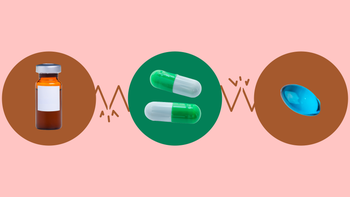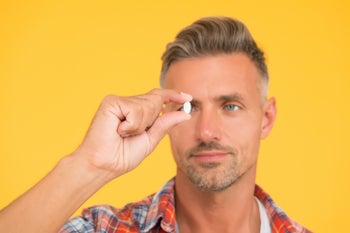
Hydroxyzine (Vistaril) for Anxiety: How It Works, Side Effects, and Dosages
Key takeaways:
Hydroxyzine (Vistaril) is an antihistamine that’s used to treat anxiety and itchiness. Adults and kids can both take it.
As with other antihistamines, hydroxyzine can cause drowsiness. This may be helpful for people struggling with insomnia, but it may interfere with various activities, such as driving.
Hydroxyzine hydrochloride and hydroxyzine pamoate are both available as lower-cost generics. GoodRx can help you save over 60% off the average retail price at certain pharmacies.
Access savings on related medications
Table of contents

If you’ve experienced itching due to allergies, you may have received a prescription for hydroxyzine (Vistaril) for as-needed relief. But this antihistamine is unique, as it has a couple possible uses. In addition to allergies, it also treats anxiety, a very different health condition.
Hydroxyzine isn’t always a first-choice anxiety treatment option, but it can come in handy in certain situations.
What is hydroxyzine?
Hydroxyzine is a prescription-only antihistamine that treats itchiness and anxiety. It’s a short-term medication that’s not meant for chronic use (more than 4 months).
Hydroxyzine is in the same family of drugs as diphenhydramine (Benadryl) and cetirizine (Zyrtec). These are two popular, over-the-counter (OTC) antihistamines you may have in your medicine cabinet at home.
Hydroxyzine hydrochloride vs. hydroxyzine pamoate
Hydroxyzine hydrochloride and hydroxyzine pamoate (Vistaril) are two versions of the same treatment. Hydroxyzine pamoate is available as a brand and generic medication, while hydroxyzine hydrochloride is only available as a generic. Its brand-name equivalents, Orgatrax and Atarax, have been discontinued.
These formulations are prescribed for anxiety in the same way. The main difference between these two versions of hydroxyzine is the way they are made. Hydroxyzine pamoate is only available as a capsule, while hydroxyzine hydrochloride comes as a tablet, syrup, and oral solution. The hydrochloride version also comes as an intramuscular injection.
How does hydroxyzine work for anxiety?
Researchers don’t know exactly how hydroxyzine works to treat anxiety. But most healthcare providers agree that it affects two main chemicals in the body: histamine and serotonin.
Search and compare options
Similar to other antihistamines, hydroxyzine blocks the effects of histamine. This reduces itchiness related to allergies. But these effects on histamine can make you sleepy as a consequence. It’s similar to how you feel after taking Benadryl or NyQuil.
But how it works for anxiety has to do with hydroxyzine’s effects on serotonin — a chemical that plays a role in mood. Unlike other antihistamines, hydroxyzine may help boost serotonin levels in the brain to treat anxiety.
Good to know: Hydroxyzine can treat many different types of anxiety, but it’s used most often for generalized anxiety disorder — especially when it’s contributing to insomnia.
What should you know before taking hydroxyzine?
Hydroxyzine is prescribed as a short-term anxiety treatment. You may take it by itself or alongside another anxiety medication, such as buspirone (Buspar) or escitalopram (Lexapro), that’s taken every day. Hydroxyzine can provide symptomatic anxiety relief while you’re waiting for the longer-term medication to kick in.
However, while hydroxyzine is an effective treatment option for short-term anxiety symptoms, it isn’t always the first medication to be prescribed.
Just like with other antihistamines, hydroxyzine can cause drowsiness and impaired alertness. These effects tend to be more intense for certain groups of people, such as adults ages 65 years and older. In these cases, other anti-anxiety therapies could offer better-tolerated relief.
Hydroxyzine dosage for anxiety
Hydroxyzine is an as-needed anxiety treatment. This is different from many other anti-anxiety medications that need to be taken regularly to be effective.
The typical adult hydroxyzine dosage for anxiety is 50 mg to 100 mg 4 times daily as needed. You can take it with or without food. Depending on how you respond to the medication, your healthcare provider may adjust your dose up or down.
Pediatric hydroxyzine dosages are usually smaller. Kids younger than 6 years old typically take 50 mg every day in divided doses. Older kids may take up to 100 mg daily in divided doses.
Get the most from your medication: Check out our pharmacist-backed tips for taking hydroxyzine for maximum effectiveness.
Common side effects: Dive deeper into side effects from hydroxyzine, including how to manage symptoms like drowsiness and dry mouth.
Treating anxiety long-term: Hydroxyzine is only meant to be used for a few months. Learn about commonly prescribed extended-use medications for anxiety and depression, plus how to afford them.
How long does it take for hydroxyzine to start working?
Hydroxyzine works quickly. Most people start to feel it kick in within 30 minutes. Its maximum effect should take hold after about 2 hours.
It’s certainly beneficial that hydroxyzine starts working quickly to relieve symptoms. But side effects, such as drowsiness, may set in quickly, too.
Hydroxyzine side effects
Hydroxyzine side effects are generally mild. Common side effects include:
Drowsiness and sedation
Nausea
Dry mouth
Dry eye
Some people are more likely to experience hydroxyzine side effects than others. For instance, hydroxyzine leaves your body through your kidneys and liver. If you have kidney or liver problems, the medication could build up and lead to extra side effects.
Side effects may also be more severe among older adults. Those taking sedative medications, such as opioids, sleeping pills, or muscle relaxants, have a higher risk of side effects, too.
Serious side effects
It’s rare, but hydroxyzine has the ability to alter your heart rhythm. It’s important to discuss any heart-related issues you have, such as atrial fibrillation, with your healthcare provider before you start taking it. You should also make them aware of any heart medications you may be taking.
Severe skin reactions are another rare side effect of hydroxyzine. Possible symptoms include a rash, small skin blisters, and a fever. Notify your healthcare provider right away if you believe you’re experiencing a skin reaction after taking hydroxyzine. This is a good precaution to take even if the rash appears to be minor.
Does hydroxyzine make you sleepy?
Yes, it can. This is related to its histamine-blocking effects.
For people with insomnia related to anxiety, sleepiness could be beneficial. However, if you’re taking hydroxyzine during the day, this can be problematic. Try to avoid operating heavy machinery (like driving a car) after you’ve taken a dose. Other tasks that require mental alertness should also be done with caution.
At the same time, it’s best to avoid anything else that might make you extra sleepy or dizzy, such as alcohol, sleeping pills, or any other medication that has similar side effects. This is especially important the first few times you take hydroxyzine.
Is hydroxyzine safe to take during pregnancy?
Generally, yes. But there’s some conflicting information.
Some organizations, such as the American College of Obstetricians and Gynecologists, say that hydroxyzine is safe to take during pregnancy. Other sources, including the medication’s labeling, say that it’s best to avoid taking hydroxyzine during the first trimester of pregnancy. Preliminary studies suggest that it may cause harm to a developing fetus.
Your healthcare provider can tell you if hydroxyzine is safe for you to take.
Hydroxyzine interactions
Hydroxyzine interacts with a number of medications and supplements. These interactions can affect how one or both drugs work, which can reduce drug effectiveness and/or put you at an increased risk of side effects.
For instance, these medications can interact with hydroxyzine and cause extra sedative side effects:
Opioids, such as hydrocodone / acetaminophen or oxycodone (OxyContin)
Benzodiazepines, such as alprazolam (Xanax) or clonazepam (Klonopin)
Sleep medications, such as zolpidem (Ambien) or eszopiclone (Lunesta)
Interactions with these medications may increase the risk of heart-related health problems:
Amiodarone (Pacerone)
Some antibiotics, including azithromycin (Zithromax) or ciprofloxacin (Cipro)
Antipsychotics, such as aripiprazole (Abilify) or quetiapine (Seroquel)
Is hydroxyzine habit-forming?
No. Some anxiety medications, such as benzodiazepines (like Xanax), can be habit-forming and lead to dependence. This means your body starts to need the medication to function normally. If you suddenly stop taking it, you may experience withdrawal symptoms. Misuse is also possible.
This isn’t the case with hydroxyzine. Unlike benzodiazepines, hydroxyzine isn’t a controlled substance. If you have anxiety and have concerns about dependency, hydroxyzine might be a good option for you.
How to save on hydroxyzine
There are many ways to save on hydroxyzine, which is available as both a brand-name and generic medication.
Save with GoodRx. GoodRx can help you save over 60% off the average retail price of the generic versions. Generic hydroxyzine hydrochloride at certain pharmacies is as low as $5.70 with a free GoodRx discount. Generic hydroxyzine pamoate at certain pharmacies is as low as $12.00 with a free GoodRx discount.
Save with patient assistance programs. If you’re uninsured or underinsured, you may be eligible for hydroxyzine’s patient assistance program, which offers the medication free of cost.
The bottom line
Hydroxyzine is an affordable, fast-acting medication that can treat anxiety in children and adults. It’s a prescription-only medication that’s often prescribed alongside a maintenance anxiety medication like escitalopram (Lexapro). However, hydroxyzine can cause drowsiness. This may be useful for people suffering from insomnia related to anxiety, but it can cause problems during situations that require mental alertness.
Why trust our experts?



References
American College of Obstetricians and Gynecologists. (2021). What medicine can I take for allergies while I’m pregnant?
American Geriatrics Society. (2023). American Geriatrics Society 2023 updated AGS Beers Criteria for potentially inappropriate medication use in older adults. Journal of the American Geriatrics Society.
Brzezińska-Wcisło, L., et al. (2017). Pregnancy: A therapeutic dilemma. Advances in Dermatology and Allergology.
Garakani, A., et al. (2020). Pharmacotherapy of anxiety disorders: Current and emerging treatment options. Frontiers in Psychiatry.
Hidalgo, R. B., et al. (2012). Antihistamine: Hydroxyzine. Handbook of Clinical Neurology.
Pfizer Laboratories Division, Pfizer Inc. (2023). Vistaril capsule [package insert].
Sawantdesai, N. S., et al. (2016). Evaluation of anxiolytic effects of aripiprazole and hydroxyzine as a combination in mice. Journal of Basic and Clinical Pharmacy.
U.S. Food and Drug Administration. (n.d.). Drugs@FDA: FDA-approved drugs.
Was this page helpful?
Related Articles
Browse medications
View AllResearch prescriptions and over-the-counter medications from A to Z, compare drug prices, and start saving.























